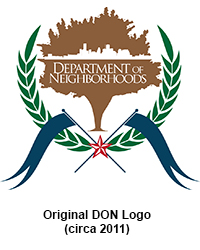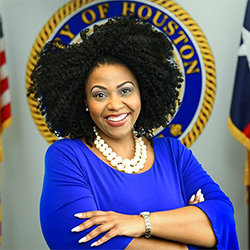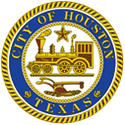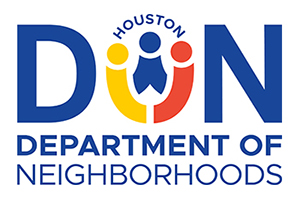|
 The Department of Neighborhoods (DON) was established by Mayor Annise Parker on August 10, 2011, by consolidating several city operations to focus on reducing blight and making neighborhoods cleaner and safer in an efficient, fiscally responsible manner. The Department of Neighborhoods (DON) was established by Mayor Annise Parker on August 10, 2011, by consolidating several city operations to focus on reducing blight and making neighborhoods cleaner and safer in an efficient, fiscally responsible manner.
DON was established through the reorganization of several divisions previously dispersed throughout the City organization to create a "one-stop-shop" for accessing City services and resolving neighborhood issues.
On February 9, 2011, City Council approved an ordinance amending Chapters 1, 10, 28 and 34 of the Code of Ordinances pertaining to dangerous and substandard buildings. The ordinance took effect on May 9, 2011, directed primarily to Chapter 10 and providing for the removal of the Houston Police Department’s Neighborhood Protection Corps. This action led to the creation of the Department of Neighborhoods’ Inspections & Public Service division, charged with city code enforcement operations formerly conducted by the Neighborhood Protection Corps.
The department initially included the following four divisions:
- City of Houston Inspection & Public Service (CHIPS), formerly Neighborhood Protection Corps: Enforces Chapter 10 of the Code of Ordinances related to open/vacant buildings, nuisances on private property, junk motor vehicles, weeded lots, and graffiti; Consists of three internal sections--Inspections, Hearings, and Prevention & Redevelopment. Note: In 2011, under the auspices of the Department of Neighborhoods, the division was named Inspections and Public Service (IPS).
- Mayor's Anti-Gang Office (MAGO): Develops and implements programs that provide case management, counseling, court‐based assessment, gang education and awareness training, job readiness training, truancy reduction, and victims’ assistance information and referrals; Utilizes three strategies: prevention, intervention, and suppression. Note: The division was renamed Mayor’s Office of Gang Prevention and Intervention (MOGPI) in 2021.
- Mayor's Citizens' Assistance Office (MCAO): Established in 1974; Coordinates responses and resolution of community concerns; Coordinates community involvement for voluntary compliance with Chapter 10 codes; Handles requests for City services, individual referrals, and field investigations; Promotes neighborhood revitalization efforts through community outreach activities; Aids with the creation of civic organizations. Note: The division was renamed Mayor’s Assistance Office (MAO) in 2020.
- Mayor's Office of Education Initiatives (MOEI): Partners with HISD’s Expectation Graduation Reach Out to Dropouts Walk and with Houston area school districts to help non‐enrolled students complete high school; Serves as After School Zones partner to provide mentoring and college/career guidance at Houston public libraries and after-school program sites; Maintains college/career prep partnerships with private, non-profit, and governmental organizations to offer students out-of-school learning opportunities that support college and career preparation. Note: The division was moved to the Mayor’s Office in 2016.
- Mayor's Office for People with Disabilities (MOPD): Provides and participates in programs and services which address the needs and rights of persons with disabilities; Facilitates delivery of services; Serves as a liaison to the Houston Commission on Disabilities, City Council, and other City departments; Makes policy and legislative recommendations; Establishes partnerships to promote community awareness; Coordinates the Mayor’s Disability Advocate of the Year Awards. Note: The division was moved to the Mayor’s Office in 2017.
- Mayor’s Office of Immigrant & Refugee Affairs (MOIRA), renamed Office of International Communities (OIC): Established in 2001 to encourage good citizenship and facilitate integration of immigrant and refugee communities living in the city; Serves international communities in Houston by promoting their well‐being and connectedness to City resources and facilitating their successful civic, economic, and cultural integration. Note: Under the auspices of the Department of Neighborhoods, the division was renamed Office of International Communities in 2011 and, subsequently, to Office of New Americans and Immigrant Communities (ONAIC) in 2016.
The new department also included the following program.
- Mayor's Volunteer Initiatives Program (VIP): Launched in 2004 to engage residents in civic service; Annually places 3,000-5,000 volunteers within various City departments; On February 3, 2010, Mayor Parker joined the Cities of Service Coalition, a bipartisan coalition of mayors committed to lead a multi-year effort to expand the impact of volunteerism; Established HoustonSERVICE.org, a Cities of Service initiative providing a platform for nonprofits, faith‐based organizations, and universities in the Houston area to post volunteer opportunities free of charge.
Department Division Changes
The Mayor expressed a desire to move back to a decentralized model and removed selected divisions from the department to allow the department to focus more on enforcing City codes in neighborhoods and working closely with homeowners to resolve complaints.
In 2016, the Mayor moved the Mayor's Office of Education Initiatives back to the Mayor’s Office and followed suit with the Mayor’s Office for People with Disabilities in 2017.
In 2016, the Office of International Communities was renamed the Office of New Americans and Immigrant Communities to distinguish the department’s office from the City’s Office of Trade and International Affairs and better reflect the immigrant and refugee population served and goals of the office.
In 2020, the Mayor’s Citizens' Assistance Office was renamed Mayor’s Assistance Office to be more inclusive, recognizing that not all Houstonians are “citizens” and that our services are for all Houstonians.
In 2021, the Mayor’s Anti-Gang Office was renamed Mayor’s Office of Gang Prevention and Intervention (MOGPI).
In 2022, the department established a new division named Office of Neighborhood Engagement (ONE). This division houses and facilitates programming that brings city government closer to communities and helps residents be more civically engaged by providing leadership training, volunteer opportunities, grants, services, and resources. ONE works in partnership with other City departments and community organizations to serve residents. The Volunteer Initiatives Program was placed under this new division.
Current Department Divisions
- Inspections and Public Service
- Mayor’s Assistance Office
- Mayor’s Office of Gang Prevention and Intervention
- Office of Neighborhood Engagement
- Office of New Americans and Immigrant Communities
|
 > Department of Neighborhoods > DON History
> Department of Neighborhoods > DON History




 The Department of Neighborhoods (DON) was established by Mayor Annise Parker on August 10, 2011, by consolidating several city operations to focus on reducing blight and making neighborhoods cleaner and safer in an efficient, fiscally responsible manner.
The Department of Neighborhoods (DON) was established by Mayor Annise Parker on August 10, 2011, by consolidating several city operations to focus on reducing blight and making neighborhoods cleaner and safer in an efficient, fiscally responsible manner.





